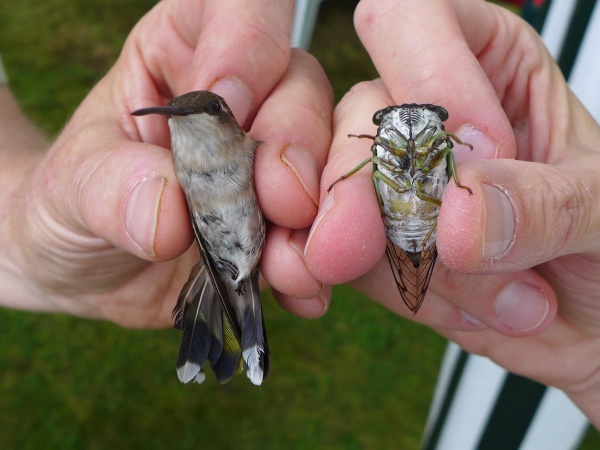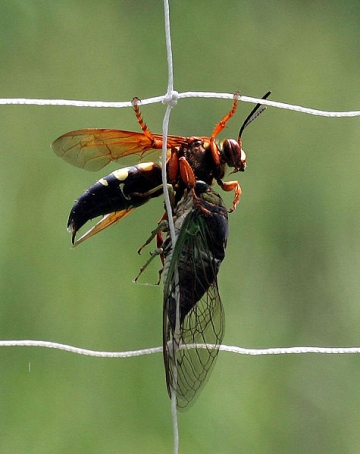
There’s a moth called the hummingbird clearwing moth that we sometimes mistake for a hummingbird, but did you know that a hummingbird can be mistaken for a bug?
On Saturday at the Cunkelman’s Neighborhood Nestwatch banding I found an annual cicada caught in one of the mist nets. I brought it back to the banding area and Bob Mulvihill held up a hummingbird next to it for comparison. The two are amazingly similar when held in this position.
We rarely confuse hummingbirds with bugs but Bob has seen a bug — a cicada killer — mistake a hummingbird caught in a mist net for a cicada.
Cicada killers (Sphecius speciosus) are large, solitary wasps that feed on nectar as adults. Each female digs an underground nest with chambers where she plans to lay her eggs. Then she patrols the area looking for cicadas to collect as food for her young. When she finds one she stings it with a venom that paralyzes it, then carries the cicada back to the nest where she places it in a chamber, lays one egg on it, and seals the chamber. When the egg hatches the larva eats the paralyzed cicada. (Yes, I’ll say it. Ewwww!)

Because cicada killers are solitary, they aren’t aggressive toward humans. You have to work very hard to make one sting you and when it does the sting is reported on Wikipedia to be as harmless as a pinprick. However see the comments below for more on pain.
Bob told us the cicada killer tried to subdue the hummingbird with a sting but the venom did not affect the bird. Whew!
(comparison photo of hummingbird and cicada by Kate St. John, cicada killer wasp photo from Wikimedia Commons; click on the image to see the original)
Very interesting, Kate! In Arizona, we have a similar wasp called a Tarantula Hawk. They also feed on nectar as adults, and the female paralyzes a tarantula on which to lay her egg. Although they are non-aggressive towards humans, if you happen to get stung, it is said to be the second most painful insect bite in the world.
Tarantula Hawk: Ewww! Hope I don’t run into one of those!
I learn so much here for the cicada it’s demise could be the end of an Edgar Allen Poe story www!
Loved it, when it made it’s call and you let go so fast….should have seen your face…It was a great learning and friends day. Glad to see you and thanks for the thistle seeds….(LOL not many ask for those)
The sting didn’t affect the bird because 1) It didn’t penetrate, due to not being close enough or2) the bird was able to get some slight distance back or 3) the wasp’s venom was depleted. And there we are as to really severe misleading reports of the sting barely hurting. When is this wasp most accessible? That’s when a sting is most likely to take place, when the wasp is dragging paralyzed prey through the grass. Even a rattlesnake bite can be lessened drastically in severity if the snake is first milked of venom. If you take a sting from a fully loaded cicada killer you will experience a trauma not forgotten unless you become senile. This link has a claim about a cicada killer chasing and killing, by sting, a hummingbird http://davesgarden.com/guides/bf/go/88/
In “Simon & Schusters Guide to Insects (1981) by professional university entomologists Dr. Ross H. Arnett Jr. and Dr. Richard L. Jacques Jr., caption with photo plate #294, “The females are said to have one of the most severe sting of any insect,” and notes they may sometimes reach 50 millimeters in length. Master Beekeeper site said a cicada killer wasp sting may hurt for as long as a week. If you want to take a fully charged CK sting, place a glass jar over its burrow hole before sunrise and wait till it exits and buzzes up into the jar, insert your hand and you won’t have any good feeling for people spreading misinformation about the sting being mild. In fact, have someone ready to call an ambulance.
Thank you for the information, Charles. I checked additional websites concerning the sting of the cicada killer wasp. Here’s what they had to say:
University of Kentucky, Entomology: https://entomology.ca.uky.edu/ef004: “Females have significant stingers which they plunge into cicadas to inject venom that paralyzes them. Without doubt, their stings are painful. However, they are not aggressive and do not have nest-guarding instinct of honey bees and hornets. You can walk through areas where they are active without attracting attention. … Males lack stingers but are territorial. … They may hover and challenge trespassers but are harmless.”
Texas A&M: http://citybugs.tamu.edu/2012/08/02/the-texas-sized-cicada-killer/ “Although female cicada killers can sting, they usually ignore people and are rarely aggressive. On the other hand, males are often territorial and may act aggressively. Here’s the deal though. Males don’t possess stingers and are completely harmless.”
Cicada Mania: http://www.cicadamania.com/cicadas/10-facts-about-cicada-killer-wasps/ This website for cicada enthusiasts says “are these terrifyingly large wasps a threat to human beings? The short answer is NO. They are so focused on cicadas or other Cicada Killer Wasps, that they could care less about you. Sure, if you step on one, squeeze one in your hand, or otherwise harass the insect, it might sting you. Unlike other wasps, it will not go out of its way to harm you. Play it safe, do not go near these wasps, particularly if you are allergic to stinging insects … That said, check out the video below of a Sphecius speciosus “mating ball” in Elias Bonaros’ hand.” Click here and scroll down to see a video of cicada killer wasps mating in someone’s bare hand.
As for the comment at Dave’s Garden where someone said they “witnessed a cicada killer chase down, sting, and kill a female ruby throated hummingbird, and had to listen to this poor humingbird scream in agony before she died”
This seems to be a unique episode, especially amazing because the sting of a cicada killer paralyzes its prey to keep it alive as food for its young. Wouldn’t the sting paralyze the hummingbird rather than kill it? How close does one need to be to hear a hummingbird scream in agony?
The writer also says “I had discussed this with several quote insect and pest experts online before i found daves garden, and they told me i was mistaken…”
this is a great place. I’ve been watching and feeding the hummers in my yard for years but now i feel like i have a sort of “coffee klatch” where i can sit and discuss them. Still worried about the eagles though….. i’m in the suburban NYC area and they were making great strides in their comeback….. now the nests are empty and there are no eagles. I’m truly scared. I believe it’s toxins in their environment — including all the lead from hunters, etc……. that is a really good reason to NOT hunt, just sayin. Thanks for being a really enjoyable site where i can share and learn.
I saw a large Cicada Killer attack a hummingbird on our deck (they both enjoyed the feeders we have) It caught the hummingbird on the deck… stinging it multiple times so I used a fly swatter to nudge the hornet off the hummingbird….he/she then attacked me (unfortunately he/she was permanently retired). The hummingbird laid there for @ 10 minutes…”woke up” & flew away.